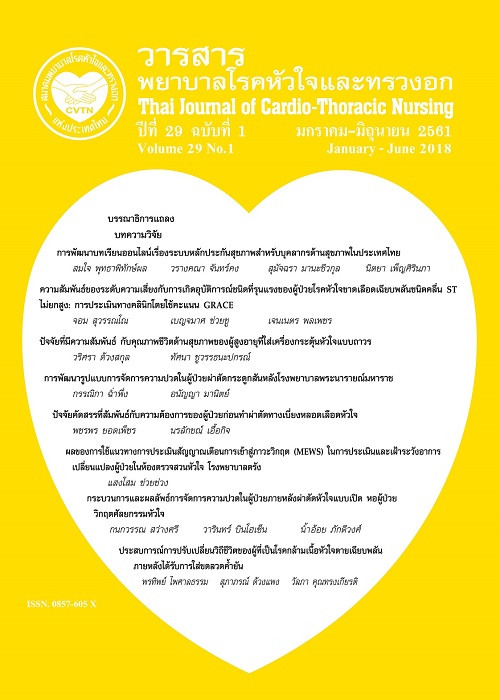ปัจจัยที่มีความสัมพันธ์ กับคุณภาพชีวิตด้านสุขภาพของผู้สูงอายุ ที่ใส่เครื่องกระตุ้นหัวใจแบบถาวร
คำสำคัญ:
ผู้สูงอายุ, เครื่องกระตุ้นหัวใจแบบถาวร, แรงสนับสนุนทางสังคม, คุณภาพชีวิตบทคัดย่อ
การศึกษาครั้งนี้มีวัตถุประสงค์ เพื่อศึกษาคุณภาพชีวิตด้านสุขภาพและปัจจัยที่มีความสัมพันธ์กับคุณภาพชีวิตด้านสุขภาพของผู้สูงอายุที่ใส่เครื่องกระตุ้นหัวใจแบบถาวร จำนวน 111 คน มารับการรักษาที่คลินิกผู้ป่วยนอกโรคหัวใจโรงพยาบาลตำรวจ และโรงพยาบาลจุฬาลงกรณ์ เครื่องมือที่ใช้ในการวิจัยคือ แบบสอบถามข้อมูลส่วนบุคคล ข้อมูลการรักษา แบบประเมินคุณภาพชีวิตในผู้ป่วยที่ใส่เครื่องกระตุ้นหัวใจแบบถาวร (AQUAREL) ระดับความรุนแรงโรคหัวใจ (NYHA) ภาวะซึมเศร้าในผู้สูงอายุ และแบบประเมินการสนับสนุนทางสังคม วิเคราะห์ข้อมูลโดยหาค่าร้อยละ ค่าเฉลี่ย ส่วนเบี่ยงเบนมาตรฐาน ค่าสัมประสิทธิ์สหสัมพันธ์เพียร์สัน และค่าสัมประสิทธิ์ Eta
ผลการวิจัยพบว่า คุณภาพชีวิตด้านสุขภาพของผู้สูงอายุที่ใส่เครื่องกระตุ้นหัวใจแบบถาวรอยู่ในระดับดี คิดเป็นร้อยละ 97.3 (Mean = 32.46, SD =10.42) เพศ และอายุไม่มีความสัมพันธ์กับคุณภาพชีวิตด้านสุขภาพของผู้สูงอายุที่ใส่เครื่องกระตุ้นหัวใจแบบถาวร (p>0.05) ภาวะซึมเศร้า ภาวะโรคร่วม และระดับข้อจำกัดในการออกแรงทำกิจกรรมมีความสัมพันธ์ทางลบกับคุณภาพชีวิตด้านสุขภาพของผู้สูงอายุที่ใส่เครื่องกระตุ้นหัวใจแบบถาวรอย่างมีนัยสำคัญทางสถิติที่ระดับ 0.05 (r = - 0.239, - 0.518 และ r = - 0.697 ตามลำดับ) การสนับสนุนทางสังคมมีความสัมพันธ์ทางบวกกับ คุณภาพชีวิตด้านสุขภาพของผู้สูงอายุที่ใส่เครื่องกระตุ้นหัวใจแบบถาวรอย่างมีนัยสำคัญทางสถิติที่ระดับ 0.05 (r = 0.452) ปัจจัยที่สามารถทำนายคุณภาพชีวิตของผู้สูงอายุที่ใส่เครื่องกระตุ้นหัวใจแบบถาวรได้แก่ ภาวะโรคร่วม ระดับข้อจำกัดในการออกแรงทำกิจกรรม และการสนับสนุนทางสังคมทำนายได้ร้อยละ 61.2
ผลการวิจัยแสดงให้เห็นว่าบุคลากรทางสุขภาพควรส่งเสริมสุขภาพผู้สูงอายุที่ใส่เครื่องกระตุ้นหัวใจแบบถาวรให้ลดข้อจำกัดในการทำกิจกรรม ป้องกันการเกิดโรคร่วมหรือมีโรคร่วมน้อยที่สุด และดูแลให้มีการสนับสนุนทางสังคมที่ดีเพื่อเพิ่มคุณภาพชีวิตได้อย่างมีคุณภาพ
เอกสารอ้างอิง
2. Brignole M, Auricchio A, Baron-Esquivias G, Bordachar P, Boriani G, Breithardt O-A, et al. 2013 ESC Guidelines on cardiac pacing and cardia resynchronization therapy. Eur Heart J. 2013;34(29):2281-329.
3. Zipes DP, Calkins H, Daubert JP, Ellenbogen KA, Field ME, Fisher JD, et al. ACC/AHA/HRS Advanced training statement on clinical cardiac electrophysiology (A revision of the ACC/AHA 2006 update of the clinical competence statement on invasive electrophysiology studies, catheter ablation, and cardioversion). J Am Coll Cardiol. 2015; 66(24):2767-802.
4. Taborsky M, Kautzner J. Summary of the 2013 ESC guidelines on cardiac pacing and cardiac resynchronization therapy: Prepared by the Czech Society of Cardiology. Cor et Vasa. 2014; 56(1):57-74.
5. Kasemsuwan P. Report of the Annual Meeting The Thai cardiac electrophysiology club; March; Bangkok: Electrophysiology Club; 2016 (in Thai).
6. Medical record and statistics in King Chulalongkorn Memorial Hospital. Statistic of older persons with permanent pacemaker implantation with all patients in cardiac catheterization Unit. Bangkok: King Chulalongkorn Memorial Hospital; 2015. (in Thai).
7. Aroonsang P. Nursing care for major problems of the elderly: applying. Khon Kaen: Klungnanatham; 2011. (in Thai).
8. Kanjanarutjawiwat W, Pitaksuteepong T, Dermsomboon R. Permanent Pacemaker : Prapokklao hospital experience complication and management. The Journal of Prapokklao Hospital Clinical Medical Education Center. 2015; 32(1): 58-67. (in Thai).
9. Pojar M, Vobornik M, Novy J. Left hemothorax: an unusual complication of delayed right ventricular perforation by a permanent pacemaker lead. J Card Surg. 2013;28(3):325-7.
10. Tang G, Zhai C, Wang Z, Chen H. Permanent pacemaker implanted into patient’s left ventricle via subclavian artery by mistake: a case report. BMC Cardiovasc Disord. 2015;15(1):1.
11. Malm D, Sandgren A. Regaining normalcy in relatives of patients with a pacemaker. Open J Nurs. 2014;4:139-49.
12. Cesarino CB, Beccaria LM, Aroni MM, Rodrigues LC, Pacheco SD. Quality of life of patients with implantable cardioversor-defibrillator: the usage of SF-36 questionnaire. Braz J Cardiovasc Surg. 2011;26(2):238-43.
13. Stofmeel MA, van Stel HF, van Hemel NM, Grobbee DE. The relevance of health related quality of life in paced patients. Int J Cardio. 2005;102(3):377-82.
14. Martijn Van Eck J, Van Hemel NM, KELDER J, Van Den Bos AA, Taks W, Grobbee DE, et al. Poor health‐related quality of life of patients with Indication for chronic cardiac pacemaker therapy. Pacing Clin Electrophysiol. 2008;31(4):480-6.
15. Udo EO, van Hemel NM, Zuithoff NP, Nijboer H, Taks W, Doevendans PA, et al. Long term quality-of-life in patients with bradycardia pacemaker implantation. Int J Cardiol. 2013;168(3): 2159-63.
16. Borges JBC, Barros RTd, Carvalho SMRd, Silva MAdM. Correlation between quality of life, functional class and age in patients with cardiac pacemaker. Braz J Cardiovasc Surg. 2013;28(1): 47-53.
17. Kurucová R, Žiaková K, Gurková E, Šimková E. Quality of life of patients with a permanent pacemaker. Ošetř. Porod. Asist. 2014;5(1):15-20.
18. Mlynarski R, Wlodyka A, Kargul W. Changes in the mental and physical components of the quality of life for patients six months after pacemaker implantation. J Cardiol. 2009;16(3):250-53.
19. Cully JA, Phillips LL, Kunik ME, Stanley MA, Deswal A. Predicting quality of life in veterans with heart failure: the role of disease severity, depression, and comorbid anxiety. Behav Med. 2010;36(2):70-6.
20. Hickey KT, Reiffel J, Sciacca RR, Whang W, Biviano A, Baumeister M, et al. Correlating perceived arrhythmia symptoms and quality of life in an older population with heart failure: a prospective, single centre, urban clinic study. J Clin Nurs. 2013;22(3-4):434-44.
21. Mayr S, Erdfelder E, Buchner A, Faul F. A short tutorial of G Power. Tutor Psychol Quant Methods. 2007;3(2): 51-59.
22. Lagewanwijit S. Heart failure. In: Lagewanwijit S, editor. Heart diseases-pathology. Chiang Mai: Faculty of Medicine, Chiang Mai University; 2013. (in Thai).
23. The Brain of Rehabilitation Group. Thai Geriatric Depression Scale. Siriraj Medical Journal. 2003;46(1):1-9. (in Thai).
24. Zimet GD, Dahlem NW, Zimet SG, Farley GK. The multidimensional scale of perceived social support. J Pers Assess.1988; 52(1):30-41.
25. Boonyamalik P. Epidemiology of adolescent suicidal ideation: Roles of perceived life stress, depressive symptoms and substance use [dissertation]. Baltimore (MD): Johns Hopkins University; 2005.
26. Chaimay P. Research methodology of public health. 3rd Edition. Songkhla: Namsilp Advertising; 2015. (in Thai)
27. Stevenson RT, Lugg D, Gray R, Hollis D, Stoner M, Williams JL. Pacemaker implantation in the extreme elderly. J Interv Card Electrophysiol. 2012;33(1):51-8.
28. Armaganijan LV, Toff WD, Nielsen JC, Andersen HR, Connolly SJ, Ellenbogen KA, et al. Are elderly patients at increased risk of complications following pacemaker implantation? A Meta-analysis of randomized trials. Pacing Clin Electrophysiol. 2012;35(2):131-4.
29. Chen HM, Chao YF. Change in quality of life in patients with permanent cardiac pacemakers: a six-month follow-up study. J Nurs Res. 2002;10(2):143-50.
30. Eliopoulos C. Gerontological nursing (8th ed). Hong Kong: Lippincott Williams & Wilkins; 2014.
31. Cunha T, Cota R, Souza B, Oliveira B, Ribeiro A, Sousa L. Correlation between functional class and quality of life among cardiac pacemaker users. Braz J Phys Ther. 2007;11(5):341-5.
32. Miller CA. Nursing for wellness in older adults. Lippincott Williams and Wilkins; 2015.
33. Meiner SE. Theories of Aging. In: Meiner SE. (Ed.), Gerontological nursing. 5 th Edition. New York: Elsevier Health Sciences; 2015. p. 16-27.
34. Figueroa C, Alcocer L, Ramos B. Psychological intervention to modify anxiety, depression and quality of life in patients with an implantable pacemaker. Psychol. 2016;7:374-81.
ดาวน์โหลด
เผยแพร่แล้ว
รูปแบบการอ้างอิง
ฉบับ
ประเภทบทความ
สัญญาอนุญาต
บทความนี้ยังไม่เคยตีพิมพ์หรืออยู่ในระหว่างส่งไปตีพิมพ์ในวารสารอื่น ๆ มาก่อน และกองบรรณาธิการขอสงวนสิทธิ์ในการตรวจทาน และแก้ไขต้นฉบับตามเกณฑ์ของวารสาร ในกรณีที่เรื่องของท่านได้ได้รับการตีพิมพ์ในวารสารฉบับนี้ถือว่าเป็น ลิขสิทธิ์ของวารสารพยาบาลโรคหัวใจและทรวงอก






